Latin and Greek Are Finding a Voice at Oxford
Spoken Latin Makes a Return to the Venerable University’s Classics Classrooms

In Oxford, Latin is everywhere. Latin mottoes, memorials and inscriptions greet you at every turn throughout the city and its colleges. Every day, during term time, Latin graces are said in dining halls. Students are still admitted to the University and receive their degrees in Latin ceremonies. On occasion, there are Latin services and Latin sermons at the University Church. And at the high point of the University year, the Encaenia Ceremony, honorary doctorates are awarded — after a traditional spread of strawberries, peaches, and champagne — with grand Latin orations in praise of the honorands in the Sheldonian Theatre.
But, with this ubiquity of Latin in mind, how far would one get in Oxford if one actually attempted to speak Latin, or at least wanted to learn how to speak it?
Certainly, in my time as a Classics undergraduate there in the late 1990s, the answer would have been not very far. For all of the Latin traditions and ceremonial around us, in our daily studies Latin was seen as a language strictly to be read, and, on occasion, laboriously written in the course of exercises. The idea that it might be taught as a spoken language was unheard of, and had it been suggested, it would without doubt have been dismissed as being too eccentric even for Oxford, the proverbial home of lost causes.
My undergraduate self would therefore have been astonished to see me, twenty years on, sitting in an online classroom based out of Oxford, discussing the Aeneid in Latin. Although I have spent time as a Latin teacher, my halting attempts at speaking the language are far outstripped by graduate and undergraduate students, whose fluency and ease both in reading and speaking the language astonish me, brought up, as I was, in the traditional ways.
This online reading class is one of the activities run by the Oxford Ancient Languages Society (the OALS, formerly the Oxford Latinitas Project). It is the fruit of an increasing change in attitude both amongst students and academics in the United Kingdom towards the value of using spoken Latin as a means of improving proficiency in the language, as well as widening its accessibility.
“I had originally been teaching in the customary way,” said Dr. Melinda Letts, College Tutor in Latin and Ancient Greek at Jesus College Oxford, and a Senior Member of the OALS. “But I became quite troubled by the scope and nature of the need among undergraduates in the field of Latin and Greek language tuition. For a start, the A-levels [the end of school exam taken in the UK by 18-year-olds] seemed to be delivering different sets of skills, so that many students who had Latin and Greek A-levels still needed a great deal of language tuition to help them read texts fluently. At the same time, the numbers of undergraduates who needed to learn the languages from scratch had also steadily increased in recent years. This is because Oxford’s welcome efforts to encourage people from a much wider variety of backgrounds to apply began to bear fruit. Ancient languages are taught mainly in private schools these days, so widening access means we need to teach more and more students the languages. The interest in Classics is not confined to those who had the chance to go to private schools and learn the languages from an early age; the interest is wide, as we can see from the numbers of people applying from a great variety of schools, but many more students at University now have to learn from scratch.

“I had been teaching the languages to these students in the so-called ‘traditional way’ — which is really a misnomer, since it’s a comparatively recent invention. I hated seeing the students whom I had met during the admissions interviews who had been full of excitement about reading ancient literature end up after a term or two seriously struggling with, sometimes even weeping over, the volume of text they had to read on the course, and the level of difficulty. These are clever, highly motivated young people, yet it was clear to me that the task was extremely difficult for many of them. I couldn’t bear teaching something that made the students feel so frustrated and anxious. Yet the languages must continue to be taught. I was still passionate about making sure that students had the best possible language capabilities so that they can develop their own independent responses to the ancient texts. Otherwise, they will end up being dependent on using translations which, because of the socio-economic profile that has traditionally defined classicists, may only reflect an essentially narrow and privileged background. I want students to have a broad set of perspectives, and to have that we need more students who can read the ancient texts confidently for themselves.”
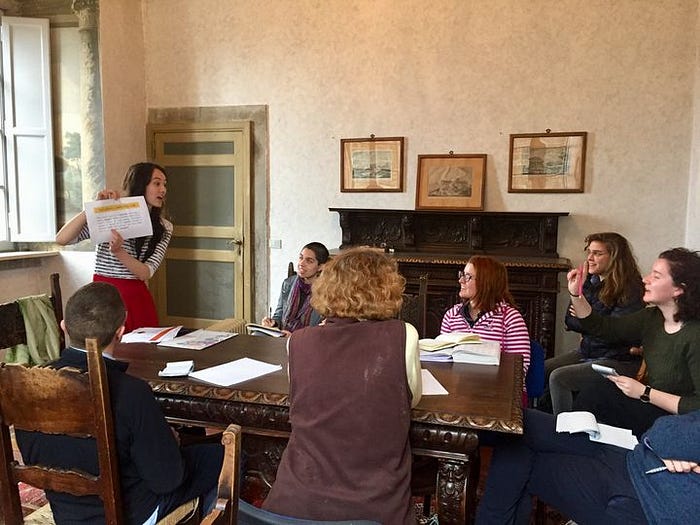
Letts tried to add active-language pedagogy to her training, but with limited success. “A lot of my questions in Latin ended up being written on the board instead of spoken,” she says. The turning point came in 2017, when she encountered Jenny Rallens, Brian Lapsa, and Lewis Scarpellino, and the student organization they had founded: the Oxford Latinitas Project. “They had experience of learning Latin through speaking the spoken language, and had started to run classes and events to get the group known. One event was a Septimana Latina — a week-long spoken Latin trip to Italy held during the Easter Vacation 2018. I went on this, and was so impressed that I recommended others to go on it as well.
One of Melinda’s students whose whole outlook on the language was changed by the Oxford Septimana was Yaamir Badhe, now a fourth-year undergraduate. “I started learning Latin at a London school when I was 11. I loved it purely because of the challenge and rigour of the language, not so much the ancient world. Later in my school career we moved to Dubai, and there I began to think about the ancient world in the context of the Indian background, the Middle East, and the Hellenistic world.”
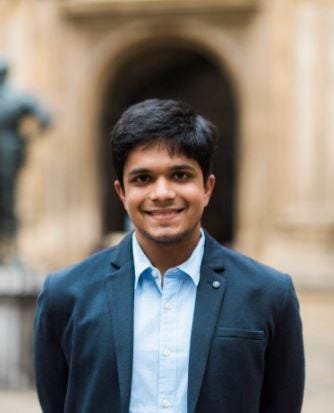
Despite his early love of the language, he had doubts about the way it had been taught. “I had always felt that the passive way of learning did make the language and the cultural context seem very distant. When learning Latin passively at school alongside French, done actively with speaking, the latter felt like a much better cultural immersion. With passive Latin, I enjoyed the sense of ‘code-cracking,’ but I didn’t feel immersed.
“When I signed up for the Septimana Latina and the other Oxford Latinitas classes, it immediately changed the way I thought about the languages. The immersion made it seem like French or Italian, a lot less distant.
‘“It was extremely difficult at first. After eight years passive learning, confined to grammar books and written translation exercises, it felt very odd to speak Latin and listen to it. I remember saying ‘nomen mihi est Yaamir’ and almost bursting out laughing, thinking ‘Why am I speaking this?’
“The real challenge was to get over thinking in English first and then translating into Latin. The full immersion in the Septimana helped to change this. There were twelve hours a day of intense classes. In the morning, there were very basic languages classes with an instructor. In the afternoon, there was ‘lumen litterarum.’ This was at the deep end, joining experienced linguists to read passages from Cicero’s Tusculan Disputations. I didn’t understand many aspects from the discussion at that stage, but I benefited from the constant exposure. There were prose composition classes done in Latin, and also singing, which is a brilliant way to learn meter. We learned several passages of the Aeneid by heart.”
When asked if this approach of using spoken Latin to learn the language was elitist or alienating, Mr. Badhe strongly disagreed. “I do admit that I come from a privileged background as I have had access to the language from the age of eleven, but learning Latin from scratch using the active method speeds up the process by many years. You can easily learn in an eight-week course what you do in the whole of secondary school. When you hear about spoken Latin it may seem elitist but this is far from the case. The language becomes very easy if you have the opportunity for long-term spoken immersion.”
During the Covid pandemic, Oxford Latinitas started offering its weekly classes online, and Mr. Badhe became the leader of one of the discussion groups. “One beautiful thing about the Virgil discussion group — it was opened up to Classicists from all over the world. People joined from Mexico, Chile. I’d never met anyone from Central and South America before, and certainly never spoken to them about Virgil before. The use of Latin breaks down cultural barriers that stop Classicists from talking about the same text. Latin is a language that belongs to everyone and no-one. No one is at an advantage because they are an English-speaking scholar. Latin is a great equaliser, as I found with these classes.”
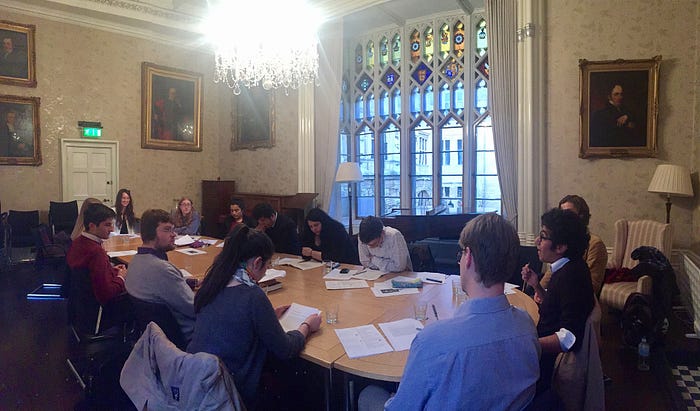
oxfordlatinitas.org)
For Mr. Badhe, the practice he has gained in speaking Latin has radically changed his capacity to appreciate the texts. “I don’t want to be misunderstood when speaking about secondary literature — it is, of course, very important — but thanks to the active method I found I could access the primary texts in a way that I could put the secondary literature aside and develop a confident appreciation of the primary text, not using a translation or commentary. Having done that, I could really also appreciate the points of view in secondary literature, and look at commentaries more critically.”
One of Mr. Badhe’s other tutors, Professor Armand D’Angour of Jesus College Oxford, is another convert to the use of spoken Latin in teaching. Professor D’Angour was originally inspired to start learning spoken Latin in 2016, after an encounter with Latin-speaking students from the Accademia Vivarium Novum on a visit to London, and also hearing about the spoken Latin project at Cornell University. Professor D’Angour is not an OALS instructor, but he has started to use spoken Latin in his own teaching with the University. Professor D’Angour began to hold his weekly tutorials on Virgil’s Eclogues in Latin.
The discussions in these tutorials, as Mr. Badhe says, were meaningful and fulfilling. “It is important to talk about the benefits of doing tutorials in Latin,” he says. “One gets through the primary texts much more efficiently, because one is reading them in Latin, not translating them. I then produced an essay in Latin on Cicero’s Pro Marcello which was just 1,500 words, but which covered as much ground as a 3,000 word essay in English, such as I’d been writing before. It’s true that you can say more with less in Latin!”
For Professor D’Angour, Mr. Badhe’s essay on the Pro Marcello, produced by Mr Badhe unexpectedly and without any prompting from him, was a eureka moment. “It blew my mind, to use a vulgar phrase. If he could do it, producing this essay in beautiful Latin, then I realised that other students can also do the same thing.”
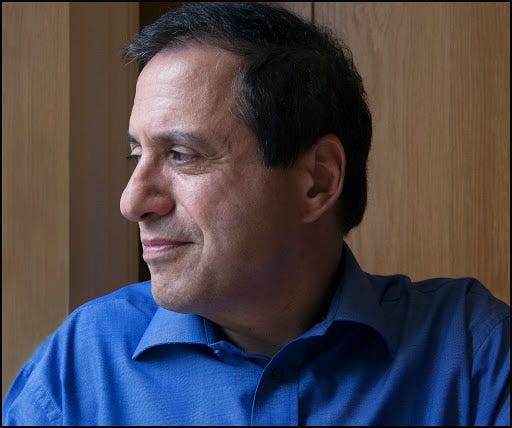
to grasp texts.”
Professor D’Angour agrees that other students who try the active method enjoy considerable benefits. “I think it is undoubtedly the case that the students feel more at home with the active Latin method. When you read Latin prose after practising with the spoken method, you have a more immediate grasp of the way it works. For example, when speaking Latin, it becomes second nature to use the subjunctive after ut when necessary. But if you have only been taught with the traditional grammar-and-translation method, you tend to stop and ask ‘why is it there?’ and think about the sequence of tenses and the like. When you use Latin as a spoken language, matters of grammar and syntax that might seem complicated to students in the traditional method are no longer an issue. This makes it much easier for students to grasp texts.”

Spoken Latin has not yet become an official part of the Oxford University Classics syllabus or pedagogy. However, the influence of the OALS and individual tutors such as Dr. Letts and Professor D’Angour is starting to have an effect on the way things are done. First-year Undergraduates from Jesus College and Dr. Letts’ other college, Harris Manchester College, are no longer sent to the University-wide traditional-style language consolidation classes. Instead, they are taught entirely in college through the Active Method. This year, this includes four Latin beginners, who are being taught by Melinda’s colleague Krasimir Ivanov, a fluent Latin speaker and experienced Active Method teacher from Bulgaria. Their Active Latin classes include the ‘constringere’ method. This is where students read pieces of Latin and then explain them in their own Latin words. Hans Ørberg’s textbook, Lingua Latina per se Illustrata, is also used to teach grammar and vocabulary in Latin itself, and the Ossa Latinitatis Sola textbook by Fr. Reginald Foster and Fr. Daniel McCarthy is also sometimes used to allow beginners to read original Latin texts. Similar work is also being done to allow the teaching of ancient Greek using the active method. This year’s OALS beginner Greek class is over-subscribed and a second class had to be set up to meet demand.
Not all of the work takes place in the classroom, Dr. Letts adds. “We also run what we call ‘noctes Musarum’ [Nights of the Muses] every fortnight in termtime. These gatherings are held largely in Latin, but this is not compulsory, as we want to welcome everybody, especially those who are in the early stages of their journey; we don’t force them to speak Latin if they are not yet comfortable doing so. The Noctes Musarum take place on Saturday evenings. Typically we start the night with chatting in Latin and drinks, for perhaps 20 minutes. Then we sing songs in Latin, often settings of poets, for example Catullus, Horace, or Ovid — though we might start the singing with the medieval student song Gaudeamus Igitur. After more refreshments we might then play games in Latin such as Versipellis [werewolf]. Students seem to enjoy these events enormously, and for us as tutors it’s wonderful to join in. Some of the best moments of the work have been at the Noctes Musarum, where I see, for example, first year students who have just taken up the language chatting in Latin after just three weeks learning the language by the active method.”
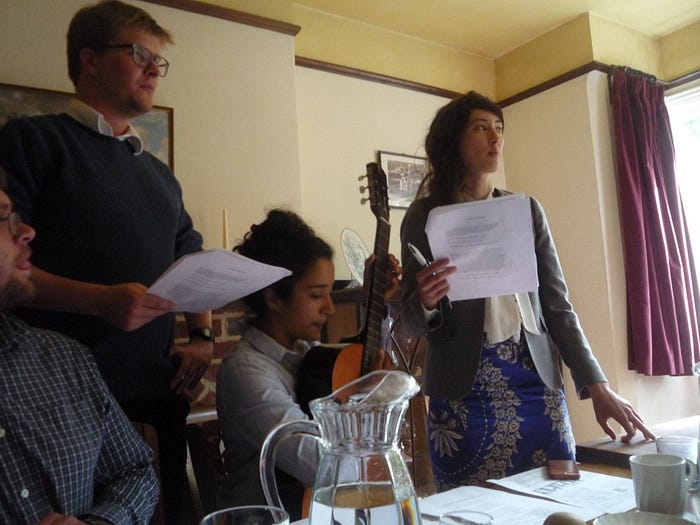
The singing and speaking has not only the benefit of pure enjoyment and helping to memorise texts. “I’ve also noticed a great improvement in the students’ ability to be able to scan poetry, both when reading it out loud and also when doing unseen translation,” said Dr. Letts. “One student, who had been singing some Ovid, on the strength of this was able to scan an unseen passage of Ovid perfectly in an exam shortly afterwards.”
Not all of Oxford’s Classical undergraduates have yet been won over, says Mr. Badhe. ‘Some people haven’t yet tried it, so they are naturally sceptical. There is a stereotype about speaking Latin which is still prevalent. However, in the short time since it started spoken Latin has become a lot more commonplace. Thanks to the demand, OALS has grown in size. When I was in the first-year, there was no active Latin on the curriculum. Now, the first years at my college are all doing active Latin.”
Professor D’Angour does not know for certain whether spoken Latin will become part of the Oxford syllabus, but he believes that this should be the University’s aim. “I think that Oxford needs to be a global centre for this kind of Classics teaching. If we don’t, there will be other centres and people will feel that Oxford is under par. If we take it on and do it well it will be a unique selling point for Oxford Classics. The active method allows a high level of attainment and fluency without the difficulty, and one which also makes this level of language learning open to those from a wide diversity of backgrounds, not just the private schools. It also opens up new vistas, encouraging people to read not just Latin from the Classical period, but also later Latin works. I hope it will become the Oxford way of learning Classics, where you know and live the languages. I also hope that the active method will become more common in British schools.”
 Meeting in the gardens to speak and read Latin (source: oxfordlatinitas.org)
Meeting in the gardens to speak and read Latin (source: oxfordlatinitas.org)
Dr. Letts would like to see all beginner Latin at Oxford being taught by the Active Method, and would like non-beginners too to be strongly encouraged to improve their language skills through this type of teaching. “It should be something that is more widely available. I want everyone to have the opportunity to experience it who wants to. There is obviously an appetite for it. It does good. I find it hard to see that it does any harm.” It certainly seems possible that spoken Latin will become an ever more visible part of teaching at Oxford. “OALS is in discussion with the Classics Faculty about putting together a pilot class in the future, following a teaching demonstration on Zoom earlier this year, which aroused a fair bit of interest. We also hope to increase our provision of spoken Greek classes, and there’s also an aspiration to set up spoken Sanskrit classes in due course.”
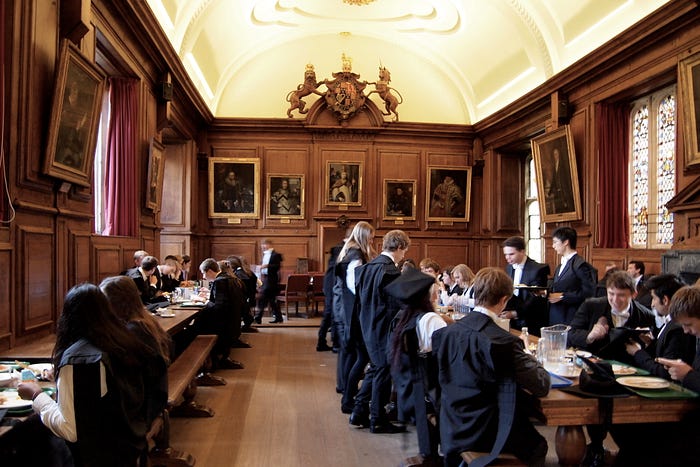 The dining hall at Brasenose College, where graces are said in Latin. (source: Wikimedia Commons)
The dining hall at Brasenose College, where graces are said in Latin. (source: Wikimedia Commons)
For those who wish to try their hand at spoken Latin, particularly as a teaching instrument, Dr. Letts offers a few tips. “I should emphasise at first that this is not ‘Latin conversation.’ One hears people talk about it as if we are running Latin conversation classes — it wrongly puts you in mind of people wearing togas. It isn’t that. It is about using the target language, Latin, as the language in the classroom. Like any pedagogical method, the first tip is simply that you need to learn how to do it. I’d advise anyone interested to start by observing the techniques, which you can see in action if you join a class, whether online or in person, and learning how to speak Latin with confidence. If, like most of us, you already have learned Latin by the traditional grammar-translation and grammar method, you need to be prepared to go slowly at first and to flounder a bit, because, no matter how well you know the language your knowledge of the language remains passive until you try to speak it. You are using a different bit of your brain, and developing a different relationship with the language. So hold your breath and take the plunge. This is the case for anyone who wants to embark on this method. You will find yourself floundering at the start as you begin to speak Latin. Give yourself time, and recognise that you have to learn how to speak. Don’t be too proud to join a beginner group (you’ll quickly progress beyond this, but it will help as you take your first steps in speaking Latin). Go as slowly as you need to at first, while you get used to finding vocabulary and structuring your sentences grammatically. Gradually you will speed up. At the same time notice the teaching methods being used by the instructor. If possible, ask the instructor to give you some guidance and ideas for starting to teach in this way yourself. Above all, don’t let the challenge of speaking in Latin distract you from using the correct grammar and syntax. Speaking Latin to our students is a massive opportunity to reinforce the importance of correct grammar in every sentence!”
“It’s hard to get one’s mind into the frame of speaking and communicating in Latin,” says Professor D’Angour. “It’s easier to say ‘let’s put it aside, that it needn’t be done’ rather than taking a bold step, saying ‘I’ll be a beginner again.’ We should put aside prejudices and inertia. You can overcome the problems and gain fluency if you work at it for a bit. It is valuable for beginners, but it is also valuable for people who have studied for decades.”
 The statue of James I, with its Latin inscription, at the Bodleian Library, Oxford.
The statue of James I, with its Latin inscription, at the Bodleian Library, Oxford.Oxford is a deeply traditional place. Change and innovation does not always come easily to it. Yet, when senior academics are calling for bold steps, it is not unreasonable to predict that change is likely to occur. Before long, the formalised Latin of graces and University ceremonies will not be the only time you will hear the ancient language in its halls. It will also often be on the lips of its Classics professors and students, an active part of their daily work and learning.
For further information we encourage you to visit the website of the Oxford Latinitas and the OALS: https://www.oxfordlatinitas.org/ . Dr. Melinda Letts has a wonderful YouTube talk on the importance of Latin in education, and the need for active language pedagogy, entitled ‘Dead Language Talking: Latin for All in the 21st Century’: https://www.youtube.com/watch?v=znuOAw7E5FI. Professor Armand D’Angour has a fine article on the thrill of speaking Latin: https://psyche.co/ideas/speaking-latin-brings-an-unmediated-thrill-to-the-classics.
Bijan Omrani is the author of Caesar’s Footprints: Journeys to Roman Gaul. His website can be found here.
Sign up to receive email updates about new articles



Comment
Sign in with